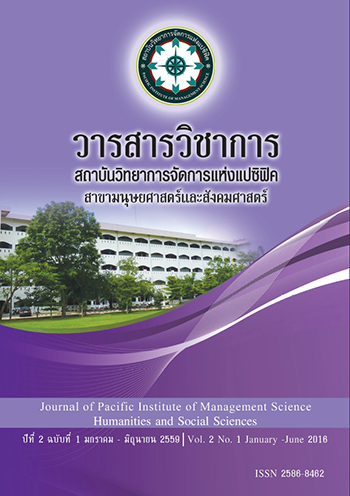Online-Focus Group: New Alternative for Research in Thailand 4.0
Keywords:
Focus Group, Online, Research, Thailand 4.0Abstract
Today, the advancement of electronic communications technology has opened up new opportunities for the collection and dissemination of research data. Nowadays, online research as a tool is becoming increasingly popular and widely used in research, such as Marketing, Social Sciences, Humanities, Medical, Public Health and Education. However, literary review in various dimensions found that even though online-focus groups are not replace all traditional focus group, it has opened up new opportunities for qualitative research both in terms of cost savings and Time. Moreover, online-focus group has the potential to reach participants with little or no spare time. So, this methodology is interesting for research that has a limited research budget or need to get quick research information. It is ideal for situations where there is no need for face-to-face interaction between participants. By the way It must b e understood that online-focus groups is a tool in the Qualitative researcher’s toolbox. So the researcher should be used when appropriate and not as a complete substitute for all other methods.
References
ปราณี โพธิสุข. (2551). แนวทางการใช้การสนทนากลุ่มอย่างเต็มศักยภาพสำหรับการวิจัยในสถานศึกษาและชุมชน. วารสารสักทอง. 14(2), 10 - 25.
วรรณี แกมเกตุ. (2551). วิธีวิทยาการวิจัยทางพฤติกรรมศาสตร์ . (พิมพ์ครั้งที่ 2). กรุงเทพมหานคร : โรงพิมพ์ แห่งจุฬาลงกรณ์มหาวิทยาลัย.
อรุณี อ่อนสวัสดีุ . (2551). ระเบียบวิธีวิจัย. (พิมพ์ครั้งที่ 3).ภาควิชาการศึกษา คณะศึกษาศาสตร์ มหาวิทยาลัยนเรศวร.
Brüggen, Elisabeth & Willems, Pieter. (2009). A critical comparison of offline focus groups, online focus groups and e-Delphi. International Journal of Market Research. 51(3), (363-381)
Murgado-Armenteros, Eva M., Torres-Ruiz, Francisco J., & Vega-Zamora, Manuela. (2012). Differences between Online and Face to Face Focus Groups, Viewed through Two Approaches.Journal of Theoretical and Applied Electronic Commerce Research, 7(2),73-86.
Freeman, T. (2006). Best practice’ in focus group research: making sense of different views. Journal of Advanced Nursing, 56(5): 491–497.
Gibbs, Anita. (1997). Focus Groups. Social Research Update. Retrieved from http://sru.soc. surrey.ac.uk/ SRU19.html
Morgan, D. L. (1997). Focus groups as qualitative research. (2nd ed.). Thousand Oaks, CA: Sage
Morgan, D.L. (1988). Focus Groups as Qualitative Research. London: Sage. Powell R.A., Single H.M., Lloyd K.R. Focus Groups in Mental Health Research: Enhancing the Validity of User and Provider Questionnaires. International Journal of Social Psychology 42, 3(1996): 193-206
Pereira, Ângela G. (2014). Electronic Focus Group (eFocus Groups). Retrieved from http://www.ivm. vu.nl/en/Images/PT1_tcm234-161506.pdf
Rezabek, Roger. (2000). Online Focus Groups: Electronic Discussions for Research. Forum: Qualitative Social Research, 1(1), Art. 18, Retrieved from http://www.qualitative-research.net/index.php/ fqs/article/view/1128/2509
Race K.E., Hotch D.F., Parker T. (1994). Rehabilitation Program Evaluation: Use of Focus Groups to Empower Clients. Evaluation Review. 18(6), (730-740).
Wascher, D. (2013). Focus group. LIAISE Toolbox. Retrieved from http://beta.liaise-toolbox.eu/ia- methods/focus-group
Downloads
Published
Issue
Section
License
บทความที่ได้รับการตีพิมพ์เป็นลิขสิทธิ์ของ สถาบันวิทยาการจัดการแห่งแปซิฟิค
ข้อความที่ปรากฏในบทความแต่ละเรื่องในวารสารวิชาการเล่มนี้เป็นความคิดเห็นส่วนตัวของผู้เขียนแต่ละท่านไม่เกี่ยวข้องกับสถาบันวิทยาการจัดการแห่งแปซิฟิค และคณาจารย์ท่านอื่นๆในสถาบันฯ แต่อย่างใด ความรับผิดชอบองค์ประกอบทั้งหมดของบทความแต่ละเรื่องเป็นของผู้เขียนแต่ละท่าน หากมีความผิดพลาดใดๆ ผู้เขียนแต่ละท่านจะรับผิดชอบบทความของตนเองแต่ผู้เดียว







